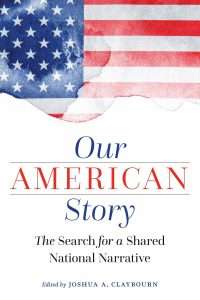The Volokh Conspiracy
Mostly law professors | Sometimes contrarian | Often libertarian | Always independent
In Search of a Shared National Narrative
The second post in the Volokh Conspiracy symposium on "Our American Story: The Search for a Shared National Narrative" (ed. by Joshua Claybourn).

Over the past two decades in America, the enduring, complicated divides of ideology, geography, party, class, religion, and race have created deep fractures in the United States, each side fighting to advance its own mythology and political interests. Of course, we all belong to groups, some as trivial as fans of the same music, some as significant as adherents to the same political party. Sectarianism helped early human beings survive by identifying outsiders and potential enemies, and it remains part of our core instinct. However, allegiance to country has in modern America transcended other loyalties to unite us around shared national narratives, events, and rituals. Although healthy nations may harbor substantial sectarianism, when loyalty to another faction outweighs loyalty to the national sect and national narrative, the political system has the potential to buckle and break.
We've seen these factional clusters deepen, harden, and separate, leading in turn to anger, misunderstanding, and hostility. Meanwhile, trust in institutions—government, business, the media, and higher education—continues to erode. Cultural warfare further splits our society, exposing fundamental differences about our views of justice and human nature. Unable to agree on first principles, we cannot agree on what it means to be American. As a result, we share few of the touchstones that, in the past, contributed to our national mythology. For instance, talk of the Thanksgiving holiday or Puritans now spawns debate over genocide of Native Americans. Talk of the Founding Fathers spurs reminders of the slave system they protected. Even the national anthem causes division in sports. As we disregard or dismantle these symbols and pastimes, thereby altering our national narrative, can we replace them with stories and rites to unite our various groups and maintain meaning in our American experiment?
Should loss of our former narratives concern us? Moving forward, can we recover or create a unifying national narrative? If so, what elements should that narrative comprise? And how should our story influence the wider world? Do the changes underway suggest an existing, common, national narrative as yet unarticulated? These questions prompted me to ask some of America's leading thinkers for essays addressing our central issue—the unifying American story.
The contributors featured in Our American Story—leaders in their fields of history, law, politics, and public policy—approach the question from different angles. Even if searching for a common narrative risks neglecting some current or future group, we acknowledge that danger and still recognize the value of exploring whether a unifying story can be achieved and, if so, what that story may be.
This project, begun with an open-ended question, invites dramatically different takes. Contributions here range from skeptical to certain, from liberal to conservative, from abstract to personal. In a civic society immersed in echo chambers, one may be tempted to read only those contributions that affirm existing views. Avoid that temptation; instead, absorb and engage each approach. The diverse responses expand our possible narratives and remind us that, if a unifying story can be achieved at all, then more than one may be feasible or even necessary. If you insist on common threads or conclusions, then we leave them to you to discover, and we hope you find these contributions important and illuminating. Ultimately, I aim for this project to prompt much-needed conversation and reflection.


Show Comments (11)